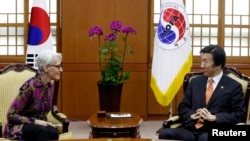Two U.S. diplomatic envoys are in Northeast Asia this week to consult with allies on stalled negotiations with North Korea about its nuclear weapons program. Washington has been bolstering regional support for maintaining sanctions on North Korea even as it expresses support for Seoul’s recent unconditional offer to meet with Pyongyang.
After meeting with officials in Seoul, Wendy Sherman, the Under Secretary of State for Political Affairs, said there is no disagreement between the United States and South Korea over how to deal with North Korea.
“We have the same policy as the Republic of Korea does and that is to ultimately have a denuclearized peninsula. A denuclearization is the first priority where North Korea is concerned and then of course we look forward to ending the division and for the Korean people to be in a unified country under democratic rule,” said Sherman.
North Korea, South Korea, Japan, China, Russia and the United States began talks in 2003 with the aim of ridding the Korean peninsula of nuclear weapons. Those talks were suspended after Pyongyang launched a ballistic missile.
The United States and South Korea have been emphasizing different approaches to restart the process. In December, Seoul proposed talks with North Korea without preconditions to organize reunions for families that were separated by the division of the country at the end of World War II.
Pyongyang rejected the offer, saying that Seoul must first lift economic sanctions before any talks could resume.
The United States wants North Korea to first take credible action to curb its nuclear program before restarting talks. Washington imposed new sanctions against Pyongyang in the wake of the alleged North Korean cyberattack on Sony Pictures Entertainment.
South Korean Special Representative for Korean Peninsular Peace And Security Affairs Hwang Joon-Kook met for talks with U.S. Special Representative for North Korea Policy Sung Kim and Japanese officials in Tokyo. Kim said the U.S. government is actively supporting South-North dialogue.
He said putting pressure on Pyongyang for its wrong behavior and keeping the doors of dialogue open for important issues, such as the nuclear program, are two separate approaches.
Japan reduced sanctions against North Korea in July after the two sides agreed to reopen an investigation into the status of Japanese citizens kidnapped by Pyongyang decades ago.
Under Secretary of State Sherman also met with officials in Beijing this week and said China continues to play an important leadership role in trying to persuade Pyongyang to give up its nuclear program.
In violation of United Nations Security Council resolutions, Pyongyang has staged a number of nuclear tests and short ballistic missile launches and has launched a small satellite into space.
South Korea’s Defense Ministry said Thursday it could not confirm reports that North Korea has restarted a nuclear bomb fuel reactor in Yongbyon after a five-month shutdown.
Kim Yong-hyun, a professor of North Korean studies at Dongguk University in Seoul, said Pyongyang may be restarting activity there as a ploy to gain concessions from the West. He noted that North Korea sees the restart of the nuclear reactor in Yongbyon as something of a bargaining chip. Kim also said Pyongyang is strongly expressing that it will continue to work on its nuclear program.
Professor Andrei Lankov, a North Korea analyst with Kookmin University in Seoul, said Pyongyang is unlikely to conduct any new nuclear tests for fear of alienating China, its key provider of economic assistance.
“If they do nuclear test they might get themselves into more serious trouble with China and this is not what they want,” said Lankov.
With joint U.S.-South Korea military drills scheduled in the coming months, tensions in the region will likely remain high.
VOA News Producer Youmi Kim and VOA Korean Service Reporter Kim Hwan Yong contributed to this report.











